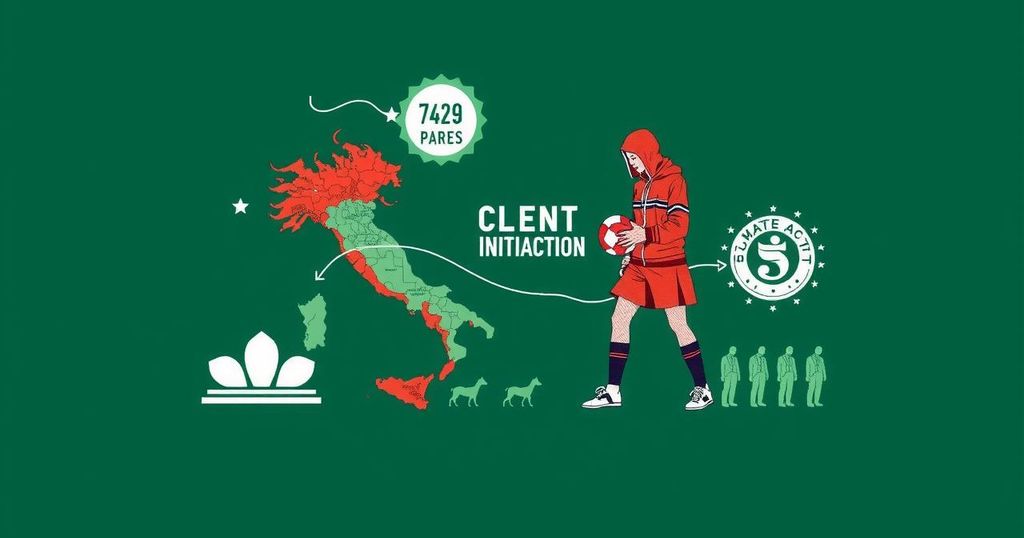Italian Fashion Brands Join Forces with Yhub to Combat Climate Change
Fifty Italian fashion brands have partnered with Yhub’s 4S Planet initiative to combat climate change by focusing on reducing CO2 emissions, enhancing sustainability practices, and fostering environmental accountability within the industry through various strategic initiatives.
In a significant move towards sustainability, fifty Italian fashion brands have joined the 4S Planet initiative, facilitated by Yhub, an Italian organization dedicated to enhancing the fashion industry’s environmental responsibility. The initiative targets a comprehensive assessment of material sourcing, energy consumption, and logistics to decrease companies’ CO2 emissions and encourage practices such as reshoring production to Italy and utilizing sustainable energy solutions, including solar panels.
As global climate negotiations stand at a pivotal juncture following the recent COP29, projections indicate that by 2024, the world will witness an average temperature increase exceeding 1.5 degrees Celsius above pre-industrial levels, a critical threshold the Paris Agreement sought to avoid. The fashion sector, contributing between 2% and 8% of global emissions, is under increasing scrutiny as textile production has surged from 58 million tons in 2000 to 124 million tons in 2023. Additionally, European citizens alone consume roughly 26 kilograms of textiles annually, with significant waste often ending up in incinerators or landfills.
Yhub aims to assist fashion brands and their supply chains in establishing traceability and reducing environmental impact. With a team of 65 professionals supporting over 3,000 companies and collaborating with more than 50 global brands, Yhub effectively manages a network of over 80,000 suppliers across 22 nations. Among its key offerings is Ympact, a digital platform designed for comprehensive impact data management and extensive deployment of the 4Sustainability framework.
Francesca Rulli, the architect of the 4Sustainability program and CEO of Yhub, articulates that, “Decarbonization projects are at the heart of the virtuous strategies of many brands and, consequently, of the manufacturing companies that are part of their supply chain.” Rulli further elaborates that, “The first step is to measure total factory consumption, detailing it by process down to the individual stage or machine. It’s not just about installing photovoltaic panels or switching to green energy: the real challenge is to rethink production processes.”
Despite current challenges, some brands are beginning to recognize the necessity of evaluating their supply chains’ contributions to emissions reduction. Rulli emphasizes the concept of climate justice in the fashion realm, advocating that brands should lead by example and financially support broader systemic changes in sustainability.
The 50 participating brands are prioritizing their sustainability efforts in four main areas, starting with a reassessment of sourcing methods to mitigate risks associated with climate change. Moreover, advancing machinery and technology investment is essential; as Rulli notes, “Sustainability is sometimes still described as a cost, but it is actually an investment, also because it leads to optimizing resources by generating a competitive advantage.”
The transformation of energy sources is another critical area. Replacing fossil fuels with electrification while ensuring that energy derives from renewable sources is vital. Lastly, Rulli advocates for a logistics overhaul by favoring maritime over air transport and pursuing the adoption of electric and hybrid vehicles for corporate travel.
The relevance of the fashion industry in global emissions is drawing increasing attention, particularly as environmental standards are raised amid urgent climate discussions. The partnership between Yhub and 50 Italian brands embodies a proactive step within this context, as the industry grapples with its significant environmental footprint. With a focus on reducing CO2 emissions and promoting sustainable practices, the 4S Planet initiative emerges as a cohesive response to the pressing climate crises underscored by recent limitations in international negotiations and the impending temperature thresholds outlined by climate scientists.
The collaboration of fifty Italian brands with Yhub’s 4S Planet program signifies a critical commitment to sustainability within the fashion sector. By rethinking sourcing, innovating production processes, transitioning to renewable energy, and revising logistics, these brands are poised to lead in reducing their environmental impact. As the industry confronts challenges tied to climate change, their integrated approach towards accountability and sustainability could serve as a model for broader alliances within fashion and beyond.
Original Source: www.the-spin-off.com




Post Comment